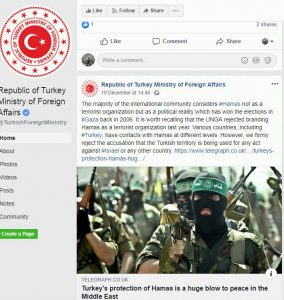
Turkey allows Hamas to conduct terrorist activities from its territory including transfer of funds to finance terrorism
A Hamas delegation headed by Isma’il Haniyeh, head of Hamas’ political bureau, recently paid a visit to Turkey. The delegation was accompanied by Jihad Yaghmour, who for the first was officially mentioned as Hamas’ representative in Turkey. Yaghmour is a Hamas terrorist operative from Beit Hanina in east Jerusalem who was involved in the abduction of IDF soldier Nahshon Waxman 1994.
He was sentenced to life imprisonment in Israel but was deported to Turkey in the Gilad Shalit prisoner exchange deal. In Turkey he liaises between Hamas and the Turkish government and the Turkish National Intelligence Organization (MIT). At the same time, in ITIC assessment, he has also been involved in covert activities, mainly the handling of terrorist squads in Judea and Samaria.
In Hamas’ perspective, his past experience as a field operative may have prepared him for the role of terrorist handler. As Yaghmour’s cover for his activities in Turkey he is president of a Turkish organization called the Association of Jerusalem and Our History.
During the past decade, since the expulsion of terrorist operatives to Turkey following the Gilad Shalit prisoner exchange deal, Turkey has become a base for Hamas’ operational operatives. Turkey allows them to handle terrorist networks in Judea and Samaria from its territory, as has been made evident by the interrogation of terrorists in Judea and Samaria who were exposed by the Israel Security Agency.
The networks handled from Turkey planned various attacks, including assassinating Israeli officials, carrying out “spectacular” attacks in Israel, undermining security and stability in Judea and Samaria and harming the control of the Palestinian Authority (PA) (conclusions drawn from the interrogation of several terrorist operatives by the Israel Security Agency – see below for details).
In addition, Turkey serves as a base for the transfer of funds to terrorist operatives in Judea and Samaria and to Hamas headquarters in the Gaza Strip. The activity of enlisting, laundering and transferring funds from Turkey to Hamas operatives was recently described at length in a report issued by the United States Treasury Department.The American report showed that the main source of funds transferred to Hamas through Turkey (and sometimes through Lebanon) is Iran.
The funds are transferred by the Qods Force of the Iranian Revolutionary Guards Corps. Involved in the process are Hamas operatives and supporters, as well as foreign exchange companies based in Turkey.
The British Telegraph recently issued an article exposing the extent of Hamas’ terrorist activity carried out from Turkey (Telegraph, December 18, 2019). Following the publication of the article, the Turkish foreign ministry issued a denial, claiming that Hamas is a “political reality” which won the elections held in the Gaza Strip in 2006 and is recognized by many states, including Turkey.
Therefore, according to the foreign ministry statement, there is nothing to prevent Turkey from maintaining contacts with the organization at different levels from other countries. However, on those grounds Turkey rejected the accusation it allows its territory to be used for activities against Israel or any other country.
In Hamas’ perspective, it became necessary to use Turkey as a base for handling terrorist networks and transferring funds after Hamas’ headquarters were forced to leave Damascus in the wake of the Syrian Civil War (2011). Moreover, Turkey’s fundamental support for Hamas, the easy communications with Turkey and the settling in Turkish territory of terrorists expelled in the Gilad Shalit prisoner exchange deal all made it easy to turn Turkey into a base to replace Damascus.
Turkey’s importance as an alternative increased after Operation Protective Edge (2014) because of Hamas’ efforts to encourage Palestinians to carry out terrorist attacks in Judea and Samaria in view of Hamas’ policy of restraint in the Gaza Strip at the time.
In addition its use as a location from which to promote terrorist attacks, Turkey provides Hamas, and the Palestinians in general, with economic support. Turkey regards the support as a tool for increasing its influence among the Palestinians and as an indirect way of supporting Hamas.
Two Turkish organizations are prominent in supporting Hamas and the Palestinians: IHH, a radical Islamic, anti-Israeli and anti-Western NGO; and TIKA, a Turkish government agency subordinate to the office of the prime minister. Both IHH and TIKA have permanent offices in the Gaza Strip, and TIKA has one in Ramallah.
Both organizations are involved in promoting projects to support the Palestinian population, but some of their activities are clearly political in nature and serve Hamas (for example, the support Turkey gives Palestinians wounded in the return marches, or TIKA’s construction of residences for Gazans whose houses were destroyed in Operation Protective Edge).
In addition, TIKA, which operates in Judea and Samaria, is very active in east Jerusalem, with the intention of increasing its influence in the city and on the Temple Mount, and in order to challenge Israel’s control.
Source: Terrorism Info





